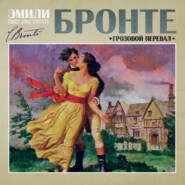По всем вопросам обращайтесь на: info@litportal.ru
(©) 2003-2025.
✖
Лучшие романы сестер Бронте / The best of the Brontë sisters
Настройки чтения
Размер шрифта
Высота строк
Поля
“Madam, Mrs. Harden says she has sent up the usual quantity.”
Mrs. Harden, be it observed, was the housekeeper: a woman after Mr. Brocklehurst’s own heart, made up of equal parts of whalebone and iron.
“Oh, very well!” returned Miss Temple; “we must make it do, Barbara, I suppose.” And as the girl withdrew she added, smiling, “Fortunately, I have it in my power to supply deficiencies for this once.”
Having invited Helen and me to approach the table, and placed before each of us a cup of tea with one delicious but thin morsel of toast, she got up, unlocked a drawer, and taking from it a parcel wrapped in paper, disclosed presently to our eyes a good-sized seed-cake.
“I meant to give each of you some of this to take with you,” said she, “but as there is so little toast, you must have it now,” and she proceeded to cut slices with a generous hand.
We feasted that evening as on nectar and ambrosia; and not the least delight of the entertainment was the smile of gratification with which our hostess regarded us, as we satisfied our famished appetites on the delicate fare she liberally supplied.
Tea over and the tray removed, she again summoned us to the fire; we sat one on each side of her, and now a conversation followed between her and Helen, which it was indeed a privilege to be admitted to hear.
Miss Temple had always something of serenity in her air, of state in her mien, of refined propriety in her language, which precluded deviation into the ardent, the excited, the eager: something which chastened the pleasure of those who looked on her and listened to her, by a controlling sense of awe; and such was my feeling now: but as to Helen Burns, I was struck with wonder.
The refreshing meal, the brilliant fire, the presence and kindness of her beloved instructress, or, perhaps, more than all these, something in her own unique mind, had roused her powers within her. They woke, they kindled: first, they glowed in the bright tint of her cheek, which till this hour I had never seen but pale and bloodless; then they shone in the liquid lustre of her eyes, which had suddenly acquired a beauty more singular than that of Miss Temple’s – a beauty neither of fine colour nor long eyelash, nor pencilled brow, but of meaning, of movement, of radiance. Then her soul sat on her lips, and language flowed, from what source I cannot tell. Has a girl of fourteen a heart large enough, vigorous enough, to hold the swelling spring of pure, full, fervid eloquence? Such was the characteristic of Helen’s discourse on that, to me, memorable evening; her spirit seemed hastening to live within a very brief span as much as many live during a protracted existence.
They conversed of things I had never heard of; of nations and times past; of countries far away; of secrets of nature discovered or guessed at: they spoke of books: how many they had read! What stores of knowledge they possessed! Then they seemed so familiar with French names and French authors: but my amazement reached its climax when Miss Temple asked Helen if she sometimes snatched a moment to recall the Latin her father had taught her, and taking a book from a shelf, bade her read and construe a page of Virgil; and Helen obeyed, my organ of veneration expanding at every sounding line. She had scarcely finished ere the bell announced bedtime! no delay could be admitted; Miss Temple embraced us both, saying, as she drew us to her heart –
“God bless you, my children!”
Helen she held a little longer than me: she let her go more reluctantly; it was Helen her eye followed to the door; it was for her she a second time breathed a sad sigh; for her she wiped a tear from her cheek.
On reaching the bedroom, we heard the voice of Miss Scatcherd: she was examining drawers; she had just pulled out Helen Burns’s, and when we entered Helen was greeted with a sharp reprimand, and told that to-morrow she should have half-a-dozen of untidily folded articles pinned to her shoulder.
“My things were indeed in shameful disorder,” murmured Helen to me, in a low voice: “I intended to have arranged them, but I forgot.”
Next morning, Miss Scatcherd wrote in conspicuous characters on a piece of pasteboard the word “Slattern,” and bound it like a phylactery round Helen’s large, mild, intelligent, and benign-looking forehead. She wore it till evening, patient, unresentful, regarding it as a deserved punishment. The moment Miss Scatcherd withdrew after afternoon school, I ran to Helen, tore it off, and thrust it into the fire: the fury of which she was incapable had been burning in my soul all day, and tears, hot and large, had continually been scalding my cheek; for the spectacle of her sad resignation gave me an intolerable pain at the heart.
About a week subsequently to the incidents above narrated, Miss Temple, who had written to Mr. Lloyd, received his answer: it appeared that what he said went to corroborate my account. Miss Temple, having assembled the whole school, announced that inquiry had been made into the charges alleged against Jane Eyre, and that she was most happy to be able to pronounce her completely cleared from every imputation. The teachers then shook hands with me and kissed me, and a murmur of pleasure ran through the ranks of my companions.
Thus relieved of a grievous load, I from that hour set to work afresh, resolved to pioneer my way through every difficulty: I toiled hard, and my success was proportionate to my efforts; my memory, not naturally tenacious, improved with practice; exercise sharpened my wits; in a few weeks I was promoted to a higher class; in less than two months I was allowed to commence French and drawing. I learned the first two tenses of the verb Etre, and sketched my first cottage (whose walls, by-the-bye, outrivalled in slope those of the leaning tower of Pisa), on the same day. That night, on going to bed, I forgot to prepare in imagination the Barmecide[14 - Barmecide feast – an imaginary feast, with empty plates, given to a beggar by rich Baghdad nobleman (from “Arabian Nights”)] supper of hot roast potatoes, or white bread and new milk, with which I was wont to amuse my inward cravings: I feasted instead on the spectacle of ideal drawings, which I saw in the dark; all the work of my own hands: freely pencilled houses and trees, picturesque rocks and ruins, Cuyp-like[15 - Cuyp-like – as in the pictures of Aelbert Jacobsz Cuyp (1620–1691), Dutch painter] groups of cattle, sweet paintings of butterflies hovering over unblown roses, of birds picking at ripe cherries, of wren’s nests enclosing pearl-like eggs, wreathed about with young ivy sprays. I examined, too, in thought, the possibility of my ever being able to translate currently a certain little French story which Madame Pierrot had that day shown me; nor was that problem solved to my satisfaction ere I fell sweetly asleep.
Well has Solomon said – “Better is a dinner of herbs where love is, than a stalled ox and hatred therewith.”
I would not now have exchanged Lowood with all its privations for Gateshead and its daily luxuries.
Chapter IX
But the privations, or rather the hardships, of Lowood lessened. Spring drew on: she was indeed already come; the frosts of winter had ceased; its snows were melted, its cutting winds ameliorated. My wretched feet, flayed and swollen to lameness by the sharp air of January, began to heal and subside under the gentler breathings of April; the nights and mornings no longer by their Canadian temperature froze the very blood in our veins; we could now endure the play-hour passed in the garden: sometimes on a sunny day it began even to be pleasant and genial, and a greenness grew over those brown beds, which, freshening daily, suggested the thought that Hope traversed them at night, and left each morning brighter traces of her steps. Flowers peeped out amongst the leaves; snow-drops, crocuses, purple auriculas, and golden-eyed pansies. On Thursday afternoons (half-holidays) we now took walks, and found still sweeter flowers opening by the wayside, under the hedges.
I discovered, too, that a great pleasure, an enjoyment which the horizon only bounded, lay all outside the high and spike-guarded walls of our garden: this pleasure consisted in prospect of noble summits girdling a great hill-hollow, rich in verdure and shadow; in a bright beck, full of dark stones and sparkling eddies. How different had this scene looked when I viewed it laid out beneath the iron sky of winter, stiffened in frost, shrouded with snow! – when mists as chill as death wandered to the impulse of east winds along those purple peaks, and rolled down “ing” and holm till they blended with the frozen fog of the beck! That beck itself was then a torrent, turbid and curbless: it tore asunder the wood, and sent a raving sound through the air, often thickened with wild rain or whirling sleet; and for the forest on its banks, that showed only ranks of skeletons.
April advanced to May: a bright serene May it was; days of blue sky, placid sunshine, and soft western or southern gales filled up its duration. And now vegetation matured with vigour; Lowood shook loose its tresses; it became all green, all flowery; its great elm, ash, and oak skeletons were restored to majestic life; woodland plants sprang up profusely in its recesses; unnumbered varieties of moss filled its hollows, and it made a strange ground-sunshine out of the wealth of its wild primrose plants: I have seen their pale gold gleam in overshadowed spots like scatterings of the sweetest lustre. All this I enjoyed often and fully, free, unwatched, and almost alone: for this unwonted liberty and pleasure there was a cause, to which it now becomes my task to advert.
Have I not described a pleasant site for a dwelling, when I speak of it as bosomed in hill and wood, and rising from the verge of a stream? Assuredly, pleasant enough: but whether healthy or not is another question.
That forest-dell, where Lowood lay, was the cradle of fog and fog-bred pestilence; which, quickening with the quickening spring, crept into the Orphan Asylum, breathed typhus through its crowded schoolroom and dormitory, and, ere May arrived, transformed the seminary into an hospital.
Semi-starvation and neglected colds had predisposed most of the pupils to receive infection: forty-five out of the eighty girls lay ill at one time. Classes were broken up, rules relaxed. The few who continued well were allowed almost unlimited license; because the medical attendant insisted on the necessity of frequent exercise to keep them in health: and had it been otherwise, no one had leisure to watch or restrain them. Miss Temple’s whole attention was absorbed by the patients: she lived in the sick-room, never quitting it except to snatch a few hours’ rest at night. The teachers were fully occupied with packing up and making other necessary preparations for the departure of those girls who were fortunate enough to have friends and relations able and willing to remove them from the seat of contagion. Many, already smitten, went home only to die: some died at the school, and were buried quietly and quickly, the nature of the malady forbidding delay.
While disease had thus become an inhabitant of Lowood, and death its frequent visitor; while there was gloom and fear within its walls; while its rooms and passages steamed with hospital smells, the drug and the pastille striving vainly to overcome the effluvia of mortality, that bright May shone unclouded over the bold hills and beautiful woodland out of doors. Its garden, too, glowed with flowers: hollyhocks had sprung up tall as trees, lilies had opened, tulips and roses were in bloom; the borders of the little beds were gay with pink thrift and crimson double daisies; the sweetbriars gave out, morning and evening, their scent of spice and apples; and these fragrant treasures were all useless for most of the inmates of Lowood, except to furnish now and then a handful of herbs and blossoms to put in a coffin.
But I, and the rest who continued well, enjoyed fully the beauties of the scene and season; they let us ramble in the wood, like gipsies, from morning till night; we did what we liked, went where we liked: we lived better too. Mr. Brocklehurst and his family never came near Lowood now: household matters were not scrutinised into; the cross housekeeper was gone, driven away by the fear of infection; her successor, who had been matron at the Lowton Dispensary, unused to the ways of her new abode, provided with comparative liberality. Besides, there were fewer to feed; the sick could eat little; our breakfast-basins were better filled; when there was no time to prepare a regular dinner, which often happened, she would give us a large piece of cold pie, or a thick slice of bread and cheese, and this we carried away with us to the wood, where we each chose the spot we liked best, and dined sumptuously.
My favourite seat was a smooth and broad stone, rising white and dry from the very middle of the beck, and only to be got at by wading through the water; a feat I accomplished barefoot. The stone was just broad enough to accommodate, comfortably, another girl and me, at that time my chosen comrade – one Mary Ann Wilson; a shrewd, observant personage, whose society I took pleasure in, partly because she was witty and original, and partly because she had a manner which set me at my ease. Some years older than I, she knew more of the world, and could tell me many things I liked to hear: with her my curiosity found gratification: to my faults also she gave ample indulgence, never imposing curb or rein on anything I said. She had a turn for narrative, I for analysis; she liked to inform, I to question; so we got on swimmingly together, deriving much entertainment, if not much improvement, from our mutual intercourse.
And where, meantime, was Helen Burns? Why did I not spend these sweet days of liberty with her? Had I forgotten her? or was I so worthless as to have grown tired of her pure society? Surely the Mary Ann Wilson I have mentioned was inferior to my first acquaintance: she could only tell me amusing stories, and reciprocate any racy and pungent gossip I chose to indulge in; while, if I have spoken truth of Helen, she was qualified to give those who enjoyed the privilege of her converse a taste of far higher things.
True, reader; and I knew and felt this: and though I am a defective being, with many faults and few redeeming points, yet I never tired of Helen Burns; nor ever ceased to cherish for her a sentiment of attachment, as strong, tender, and respectful as any that ever animated my heart. How could it be otherwise, when Helen, at all times and under all circumstances, evinced for me a quiet and faithful friendship, which ill-humour never soured, nor irritation never troubled? But Helen was ill at present: for some weeks she had been removed from my sight to I knew not what room upstairs. She was not, I was told, in the hospital portion of the house with the fever patients; for her complaint was consumption, not typhus: and by consumption I, in my ignorance, understood something mild, which time and care would be sure to alleviate.
I was confirmed in this idea by the fact of her once or twice coming downstairs on very warm sunny afternoons, and being taken by Miss Temple into the garden; but, on these occasions, I was not allowed to go and speak to her; I only saw her from the schoolroom window, and then not distinctly; for she was much wrapped up, and sat at a distance under the verandah.
One evening, in the beginning of June, I had stayed out very late with Mary Ann in the wood; we had, as usual, separated ourselves from the others, and had wandered far; so far that we lost our way, and had to ask it at a lonely cottage, where a man and woman lived, who looked after a herd of half-wild swine that fed on the mast in the wood. When we got back, it was after moonrise: a pony, which we knew to be the surgeon’s, was standing at the garden door. Mary Ann remarked that she supposed some one must be very ill, as Mr. Bates had been sent for at that time of the evening. She went into the house; I stayed behind a few minutes to plant in my garden a handful of roots I had dug up in the forest, and which I feared would wither if I left them till the morning. This done, I lingered yet a little longer: the flowers smelt so sweet as the dew fell; it was such a pleasant evening, so serene, so warm; the still glowing west promised so fairly another fine day on the morrow; the moon rose with such majesty in the grave east. I was noting these things and enjoying them as a child might, when it entered my mind as it had never done before: –
“How sad to be lying now on a sick bed, and to be in danger of dying! This world is pleasant – it would be dreary to be called from it, and to have to go who knows where?”
And then my mind made its first earnest effort to comprehend what had been infused into it concerning heaven and hell; and for the first time it recoiled, baffled; and for the first time glancing behind, on each side, and before it, it saw all round an unfathomed gulf: it felt the one point where it stood – the present; all the rest was formless cloud and vacant depth; and it shuddered at the thought of tottering, and plunging amid that chaos. While pondering this new idea, I heard the front door open; Mr. Bates came out, and with him was a nurse. After she had seen him mount his horse and depart, she was about to close the door, but I ran up to her.
“How is Helen Burns?”
“Very poorly,” was the answer.
“Is it her Mr. Bates has been to see?”
“Yes.”
“And what does he say about her?”
“He says she’ll not be here long.”
This phrase, uttered in my hearing yesterday, would have only conveyed the notion that she was about to be removed to Northumberland, to her own home. I should not have suspected that it meant she was dying; but I knew instantly now! It opened clear on my comprehension that Helen Burns was numbering her last days in this world, and that she was going to be taken to the region of spirits, if such region there were. I experienced a shock of horror, then a strong thrill of grief, then a desire – a necessity to see her; and I asked in what room she lay.
“She is in Miss Temple’s room,” said the nurse.
“May I go up and speak to her?”
“Oh no, child! It is not likely; and now it is time for you to come in; you’ll catch the fever if you stop out when the dew is falling.”
The nurse closed the front door; I went in by the side entrance which led to the schoolroom: I was just in time; it was nine o’clock, and Miss Miller was calling the pupils to go to bed.
It might be two hours later, probably near eleven, when I – not having been able to fall asleep, and deeming, from the perfect silence of the dormitory, that my companions were all wrapt in profound repose – rose softly, put on my frock over my night-dress, and, without shoes, crept from the apartment, and set off in quest of Miss Temple’s room. It was quite at the other end of the house; but I knew my way; and the light of the unclouded summer moon, entering here and there at passage windows, enabled me to find it without difficulty. An odour of camphor and burnt vinegar warned me when I came near the fever room: and I passed its door quickly, fearful lest the nurse who sat up all night should hear me. I dreaded being discovered and sent back; for I must see Helen, – I must embrace her before she died, – I must give her one last kiss, exchange with her one last word.
Having descended a staircase, traversed a portion of the house below, and succeeded in opening and shutting, without noise, two doors, I reached another flight of steps; these I mounted, and then just opposite to me was Miss Temple’s room. A light shone through the keyhole and from under the door; a profound stillness pervaded the vicinity. Coming near, I found the door slightly ajar; probably to admit some fresh air into the close abode of sickness. Indisposed to hesitate, and full of impatient impulses – soul and senses quivering with keen throes – I put it back and looked in. My eye sought Helen, and feared to find death.
Close by Miss Temple’s bed, and half covered with its white curtains, there stood a little crib. I saw the outline of a form under the clothes, but the face was hid by the hangings: the nurse I had spoken to in the garden sat in an easy-chair asleep; an unsnuffed candle burnt dimly on the table. Miss Temple was not to be seen: I knew afterwards that she had been called to a delirious patient in the fever-room. I advanced; then paused by the crib side: my hand was on the curtain, but I preferred speaking before I withdrew it. I still recoiled at the dread of seeing a corpse.
“Helen!” I whispered softly, “are you awake?”

















